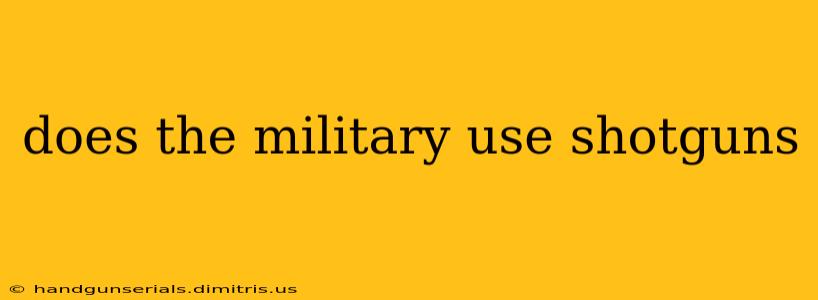Does the Military Use Shotguns? A Comprehensive Look at Shotgun Roles in Modern Warfare
The short answer is: yes, but not in the way often depicted in popular media. While shotguns aren't the primary weapon of choice for most military branches, their specialized capabilities ensure a niche role in modern warfare. Understanding their application requires looking beyond the Hollywood image of a soldier wielding a pump-action shotgun in close-quarters combat.
The Limitations of Shotguns in a Military Context
Before diving into the specific uses, it's crucial to address why shotguns aren't the ubiquitous firearm they might appear to be in movies. Their limitations in a military context are significant:
- Limited Range and Accuracy: Compared to rifles and submachine guns, shotguns have a drastically shorter effective range. Their spread pattern, while excellent at close range, becomes increasingly inaccurate beyond 25-30 meters. In open combat scenarios, this severely limits their utility.
- Ammunition Capacity: Shotgun magazines typically hold fewer rounds than standard military rifles, demanding more frequent reloading and potentially leaving a soldier vulnerable during engagements.
- Weight and Maneuverability: Some shotguns, especially those designed for specialized purposes, can be heavier and bulkier than other firearms, hindering maneuverability in tight spaces or during prolonged operations.
Where Shotguns Find Their Niche in Military Applications
Despite these limitations, the unique capabilities of shotguns make them suitable for specific roles:
-
Close-Quarters Combat (CQB): This is perhaps the most common military application. In confined spaces like buildings or vehicles, the shotgun's devastating close-range power provides a significant advantage. The spread of shot increases the likelihood of hitting a target, even if aiming is hampered by limited visibility or rapid movement. Specialized breaching shotguns are also utilized for forcible entry.
-
Vehicle Defense: Military vehicles, particularly armored personnel carriers (APCs) and other transport vehicles, may carry shotguns as a defensive weapon against close-range threats. The ability to quickly neutralize immediate threats in the vicinity of the vehicle is invaluable.
-
Specialized Units: Certain specialized units, such as SWAT teams or counter-terrorism units, frequently utilize shotguns due to their effectiveness in CQB situations where precision at longer ranges is less critical. The stopping power of a shotgun round is particularly important in situations where a swift incapacitation of a threat is necessary.
-
Non-Lethal Options: While less common, some militaries utilize less-lethal shotguns firing beanbag rounds, rubber bullets, or other non-lethal projectiles for crowd control or riot suppression. This reduces the risk of lethal force while still providing a means of effective control.
Types of Military Shotguns
Military-issued shotguns often differ from commercially available models. They frequently feature:
- Enhanced Durability: Military shotguns are designed to withstand harsher conditions and extended use than civilian models.
- Modular Design: Allowing for customization with different barrels, stocks, and accessories tailored to specific missions.
- Specialized Ammunition Compatibility: The ability to use a variety of ammunition types, including specialized rounds for breaching, non-lethal applications, or specific target engagement.
Conclusion
While not a primary weapon system for most military forces, the shotgun fills a specialized niche. Its exceptional close-range stopping power and adaptability make it a valuable asset in specific combat situations, vehicle defense, and specialized unit operations. The perception of shotguns in popular culture often overshadows their precise and limited, yet crucial, military applications.

